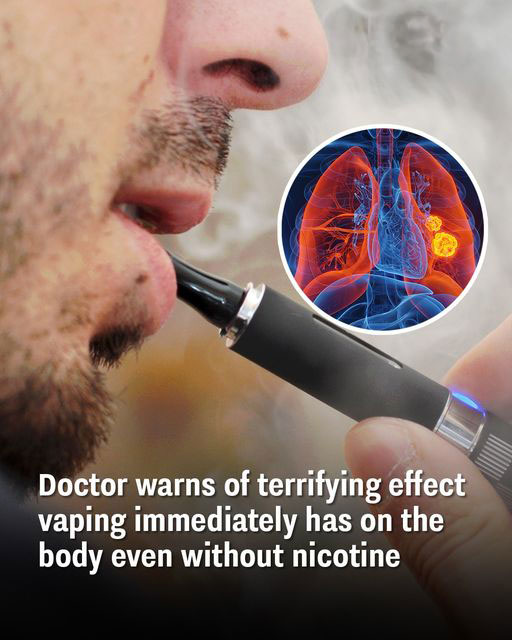While many people assume that vaping is a safer alternative to smoking traditional cigarettes, recent scientific research has revealed some alarming truths. A groundbreaking study has shown that even nicotine-free vaping can pose significant risks to your health. For years, e-cigarettes have been marketed as a less harmful option, but the evidence now suggests that vaping, regardless of nicotine content, can have serious consequences for your body—especially your vascular system. This finding may be the wake-up call many need to reconsider their vaping habits.

The study in question was conducted by researchers at the University of Pennsylvania and published in Medical and Life Sciences. It focused on the effects of vaping and smoking on the body’s vascular system—the intricate network of blood vessels responsible for circulating blood and lymph fluid throughout the body. This system, also known as the circulatory system, plays a vital role in delivering oxygen and essential nutrients to tissues while removing waste products. Any disruption in this system can have far-reaching health consequences.
For the study, researchers selected 31 healthy individuals between the ages of 21 and 49, including both vapers and smokers. Each participant underwent two MRI scans—one before and one after vaping or smoking. The participants used e-cigarettes with nicotine, e-cigarettes without nicotine, and traditional tobacco cigarettes. Researchers measured oxygen flow by analyzing both the rate at which blood flowed and the amount of oxygen returning to the heart. These results were then compared to a control group of 10 non-smokers and non-vapers aged 21 to 33.
The findings were eye-opening. Every type of smoking and vaping—whether it contained nicotine or not—caused a significant reduction in resting blood flow velocity in the superficial femoral artery. This artery, which supplies oxygenated blood to the lower body, plays a crucial role in overall circulation. The most severe reduction in vascular function occurred after participants inhaled nicotine-containing e-cigarettes. However, nicotine-free e-cigarettes weren’t far behind, demonstrating that the absence of nicotine does not eliminate the health risks associated with vaping.
Perhaps even more concerning was the drop in venous oxygen saturation across the board. Whether participants were using nicotine or nicotine-free devices, their bodies received less oxygen, and cardiac output appeared insufficient to meet tissue oxygen needs. This finding debunks the common assumption that nicotine-free vaping is harmless. In reality, both nicotine and non-nicotine vaping can disrupt oxygen delivery to tissues, potentially leading to long-term health consequences.
Dr. Marianna Nabbout, the lead author of the study, emphasized the importance of these findings. She explained, “This study highlights the acute effects smoking and vaping can have on a multitude of vascular beds in the human body. If acute e-cigarette use can have an immediate effect on the arteries, long-term usage may induce vascular disease.” Her warning is clear: whether your vape contains nicotine or not, you’re still exposing your body to unnecessary risks.
But the dangers of vaping don’t stop with the vascular system. Research has shown that chemicals commonly found in e-cigarette vapor, such as formaldehyde and acrolein, can irritate and damage lung tissue over time. Heavy metals, including lead and nickel, can also leach from vape device components and accumulate in the body, potentially causing neurological and respiratory issues. In severe cases, vaping has been linked to a condition known as EVALI (e-cigarette or vaping-associated lung injury), a life-threatening condition that can lead to chronic respiratory problems or even death.
Fortunately, the body has an incredible ability to heal itself, and quitting vaping can reverse many of these adverse effects. Even after years of use, significant improvements can be observed within days or weeks of quitting. Blood flow and oxygen levels typically return to normal within just a few days, and lung function begins to improve over the following weeks and months. While nicotine withdrawal can be challenging—often accompanied by irritability, cravings, and fatigue—the long-term health benefits far outweigh the short-term discomfort. Increased energy, better heart health, and reduced risks of vascular disease and cancer are just a few of the rewards awaiting those who quit.
The bottom line is clear: vaping, even without nicotine, is not a harmless habit. The evidence from this study confirms that e-cigarette use has immediate and measurable effects on blood flow, oxygen delivery, and overall vascular function. Beyond these immediate consequences, the long-term risks of lung damage, cardiovascular disease, and neurological issues cannot be ignored.
However, there’s good news. The body is resilient, and quitting vaping offers a real chance for recovery. Each day without vaping brings you closer to improved health, reduced disease risk, and a stronger body overall. While it may require determination and support, quitting vaping is one of the most important steps you can take for your long-term health.
This study serves as a powerful reminder: no form of vaping is truly safe. Whether you’re using a device with or without nicotine, the risks to your vascular system, lungs, and overall well-being are significant. The best choice is to quit entirely and give your body the opportunity to heal. Your future self will thank you for making the decision to prioritize your health over a habit that science has shown to be far more harmful than previously believed.





